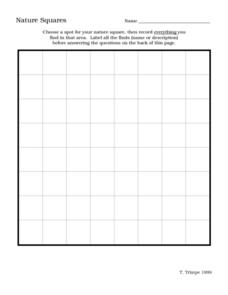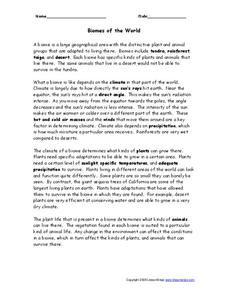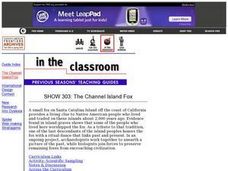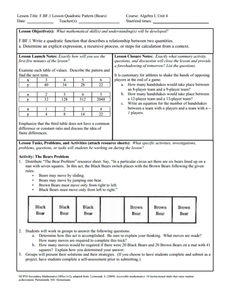Curated OER
Daisyworld: Stella Mac or PC
Students investigate Daisyworld, a very simple planet that has only two species of life on its surface - white and black daisies, and bare ground. They construct a Stella model of Daisyworld and perform guided experiments to explore the...
Curated OER
Ecology 8 Land Biomes
Pupils identify and describe the main features of one land biome. After researching what a biome is, they give various examples of biomes around the world and in their backyards.
Curated OER
Nature Squares
In this nature observation worksheet, students set up a grid on a small plot of land and record all biotic and abiotic items in the grid. They complete 5 short answer questions based on their observations.
Curated OER
Biomes of the World
In this biomes worksheet, learners read an article on biomes and answer 10 multiple choice, short answer or true and false questions relating to biomes.
Curated OER
What's in Our Woods?
Students observe their local forest and document the change that occurs over the school year. For this forestry lesson, students utilize a GPS to mark a certain area of the woods as their study area for the remainder of the year....
Curated OER
Trees of our Forests
Young scholars use a field guide in order to identify trees. In this trees lesson plan, learners classify the trees that they identify based on their relationships. Young scholars take a trip outdoors to look at trees.
Curated OER
Exploring Hawaii's Beaches
Fourth graders search the shore and find objects on the beaches of Hawaii. In this exploring Hawaii's beaches lesson, 4th graders play "I Spy" with objected collected at the beach. Students compare biotic and abiotic materials and...
Curated OER
Salinity Of Soil
Fourth graders investigate the contents of various types of soil to determine the differences in salinity levels. They conduct an experiment of observing the plants in the different soils. Students then determine survival rates by...
Curated OER
Food webs and Energy Flows
Students become familiar with food chains. In this food chains lesson, students understand that as consumers eat other consumers energy is passed. Students understand the vocabulary associated with food chains.
Curated OER
SHOW 303: The Channel Island Fox
Students explore how archaeologists and other scientists use different clues to piece together a picture of the past. Students perform activities that allow them to conduct three types of scientific research. They discuss their...
Curated OER
Biotic Factors
Students identify individual organism, a species, and a population within the study community. They identify biotic factors at the site and attempt to characterize the site's species diversity.
Curated OER
Parts of a Crinoid
Students study the parts of a crinoid. In this parts of a crinoid activity, students look at pictures of a crinoid fossil or examine an actual fossil if one is available. They match names to pictures of the parts in the second part of...
Curated OER
DNA the Easy Way (and "Gram Stain" Without the Mess)
Students visualize DNA from cells and explain the basis and importance of the Gram-stain reaction and to perform the KOH test equivalent.
Curated OER
Goals of the Diversity of Life Unit
Students are introduced to the unit on the importance of diversity of life and the role that interdependence plays in our worlds. this is part of a multi-lesson unit on the diversity of life.
Curated OER
Bears
Students complete a variety of bear-related activities. They sort and graph teddy bears, distinguish between real and non-real bears and research bear life cycles and habitats.
Curated OER
Insects and Spiders
Students make either and insect or a spider using materials their teacher provides. They then draw of picture of their organism and defend why it is either a spider or an insect.
Curated OER
Sarita Wetland Restoration
Students collaborate on the plannng and implementation of the Sarita Wetland Restoration. The Sarita Wetland is the remnant of former Lake Sarita that was drained in the early 1900's. The goal of the entire project is to improve water...
Curated OER
Make Sense of Nature
Learners participate in this program that heightens their awareness and curiosity of nature as well as their sense of adventure and exploring new surroundings. They identify and choose an object from nature after exploring it with other...
Curated OER
Arabian Camel or Dromedary
In this camel worksheet, students study the diagram for an Arabian camel otherwise known as a dromedary. Students read the characteristics of the animal and may click on associated links to learn more.
Curated OER
Compost Tag
Students identify biodegradable items. In this environmental lesson, students participate in a game of tag. A student's name is called out along with a biodegradable item and the student is tossed a ball.
Curated OER
Mixed Prepositions 17
In this preposition worksheet, students fill in blanks in sentences, clicking on a "check" button for immediate feedback. A reference web site is given for additional activities.
Curated OER
Dig Magazine Archeology Quiz #106
In this Dig Magazine archeology quiz, learners answer 12 multiple choice questions complementing the October 2009 issue. Page contains answer and additional resources link.
Ohio State University
Ohio State University: Plant Classification
Review of binomial nomenclature and levels of classification in the plant kingdom. A quiz is available for students along with pictures, charts, and links.
CK-12 Foundation
Ck 12: Episd: Plant Classification
[Free Registration/Login may be required to access all resource tools.] Understand how plants are classified and be able to identify vascular and nonvascular plants.
Other popular searches
- Plant Classification Key
- Plant Classification System
- Plant Classification Charts
- Lower Plant Classification
- Animal Plant Classification
- Plant Classification Lab
- Plant Classification Spores
- Animal and Plant Taxonomy
- Non Vascular Plant Taxonomy
- Seedless Plant Taxonomy
- 4 Plant Classifications

























